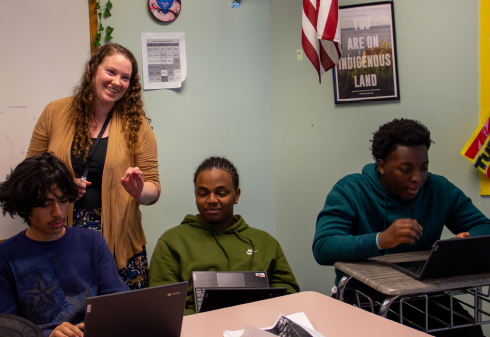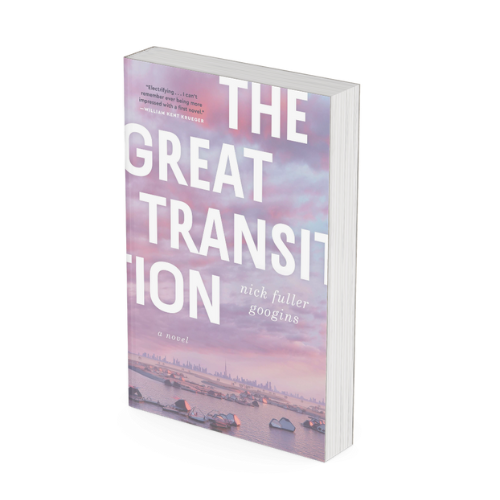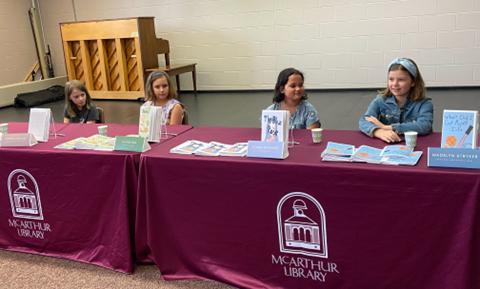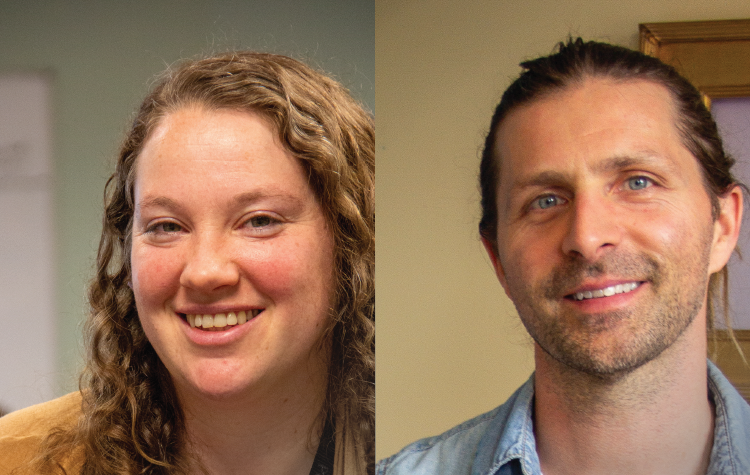By day they work as teachers. By night they’re crafting characters and stories to engage readers of all ages as published authors.
Nick Fuller Googins, a fourth grade teacher at CK Burns School in Saco, and Rebecca Turkewitz , a 10th grade English teacher at Casco Bay High School in Portland, are inspiring students to think outside of the four walls of their schools and investigate a world only they can create through writing.
Maine Educator sat down with the authors to learn more about how they incorporate their expertise as writers into their world as educators, sharing ideas on how all educators can help support their students in the classroom.
Q & A
Q: How do you encourage your students to develop their own voice in their writing? Are there specific writing exercises you can share that have been effective?
A: Nick Fuller Googins
Writing is so personal, so creative, it’s hard to pinpoint what makes a “good” voice or tone. One thing I do a lot is have kids share their writing with each other, and I especially like to use strong examples of their own work as our mentor texts. But the most valuable thing I’ve learned to do is to simply build up my students’ confidence in writing. With confidence, in any artform or walk of life, we suddenly have permission to try new things, be our true selves, experiment with something “risky,” and to try again if we fail. To build confidence in my young writers, I’m generous with specific, thoughtful compliments, whether for a piece of writing, or a small decision a writer has made. I can literally trace my path as a writer back to three specific compliments given to me, so I know how far a seemingly small compliment can stick with a kid, and for how long. One compliment about their writing, and suddenly a student is thinking, “Hmm, maybe I am good at this? Maybe I should keep doing it? What if I tried it this other way?”
Q: How do you approach the task of engaging reluctant readers in the classroom
A: Rebecca Turkewitz
I tend to teach a lot of short stories and essays, because I think students are more likely to discover something they love when they’re exposed to many different styles and genres and authors. And, when I teach longer texts, such as novels or memoirs, I try to provide students with the context they’ll need to fully understand and engage with the text.
A: Nick Fuller Googins
I am constantly sharing with my students what I’m reading, and how much I love it. I try to make my love of reading addictive, for example sharing how I stayed up too late because I couldn’t put down a book, and then I’ll go ahead and show them the book and explain the plot to them in a fun way. I try to keep this up from the first day of school (Look at this stack of books I read over the summer!) to the last (Look at this stack I’m going to read this summer!). I also love sharing kid-friendly reading memes and fun library social media videos. Lastly, some of my best reading memories are from 4th grade, reading Superman and Batman comics with my two best friends. There is something so special about reading together with people we love; so, for reluctant readers especially, I really try to lean on social book clubs, linking kids into reading partnerships or small groups with their buddies.
Q: How has your experience as a teacher influenced your writing?
A: Rebecca Turkewitz
I’m constantly talking with students about the creative process and the tools that writers use. Almost always, when I’m teaching a lesson on literary techniques or listening to students analyze the work of an author I admire, I learn—or relearn—something that benefits my own writing practice.
A: Nick Fuller Googins
I strive to make my classroom a place where I would’ve wanted to spend the fourth grade, and I often think about my writing in the same way: would I be bored by this chapter? Would I find this dialogue funny? Is this needlessly confusing? Would I, honestly, want to read this book? I sometimes think of teaching as a performance, like each day I am getting on stage for a six-hour improv play with a captive audience of twenty-ish human beings, not all of whom want to be there, and even the most eager of whom are steadily losing focus. All teachers have this similar audience, and as we go through our days, we are trying to balance the many competing feelings, needs, interests, and visions, often adjusting (“editing”) on the fly. I like to believe that my experience in this role has given me a sort of “group empathy” that translates to my hypothetical readers. As I’m writing, or revising, I’m always asking: Okay, will the reader need a chapter break here for a little rest? Is this boring? Do they need me to really explain this plot point for them, or can I trust that they will figure out what’s happening, and feel a sense of accomplishment for putting the pieces together on their own?
Q: In what ways do you incorporate your writing into your teaching curriculum?
A: Nick Fuller Googins
Mostly through my many mistakes and failures! This past spring, I took a screenshot of a time I’d very publicly, and very embarrassingly, misspelled the title of my book. Oof. But it was great to show the kids that A) everyone makes mistakes and B) this is why we always edit our work.
I also love to share all my rejections as a writer. I have a fat manilla envelope with hundreds of rejection slips I’ve amassed over the years. Every fall I have the kids hold the envelope to estimate how many rejections Mr. Fuller earned. Then, as a group, they sort and count the rejections. This is a fun, concrete way of showing growth-mindset in action. I explain how proud I am of my rejections, and how they hurt, sure, but that I never could have written and published my first novel without all the failures along the way, and everything those sometimes-painful moments taught me. This translates into countless other areas besides writing, and I think we teachers can do this with so many different areas of our lives, showing off all the many ways that we, as human beings, mess up, get rejected, and keep on going.

Q: Do you find that your teaching experiences provide you with a unique perspective when creating characters or settings in your stories?
A: Nick Fuller Googins
I don’t have children of my own, but I’ve taught everything from kindergarten through college, and over these years have probably spent more total hours with children than some parents. Absolutely this experience helps me bring my young characters to life on the page. In my new novel, for instance, the main character, Emi, is a fifteen-year-old girl. Could I have written Emi without all the time I’ve spent with adolescent kids? Maybe, but I doubt she would’ve felt as real.
A: Rebecca Turkewitz
Teaching requires a lot of perspective-taking and empathy, which I do think helps with developing characters.


Writing Exercise to Try
Elementary Level: Courtesy of Nick Fuller Googins
One writing exercise I enjoy is for Halloween, courtesy of “826,” a California-based youth-writing program: first the class brainstorms goals that would be almost impossible for a zombie to achieve (win a marathon, learn to swim, bike to a friend’s house, etc). Then students write a short story from the perspective of a child zombie who wants, more than anything in life, to do exactly one of these things. It’s a fun way of teaching how desire and struggle play into narrative writing.
Middle/High School Level: Courtesy of Rebecca Turkewitz
Helping students find their own writing voices is one of the great joys of teaching English. One exercise I love is letting students browse the website 100 Word Stories, and then write their own 100 word story or memoir. Because these stories are so short, every single word matters. Students need to be really intentional and often wind up taking some interesting creative risks.
MEET The Authors

The Great Transition
By: Nick Fuller Googins
Nick Fuller Googins is the author of the novel, The Great Transition (Atria Books). His short fiction and essays have appeared in The Paris Review, Men’s Health, The Sun, The Los Angeles Times, and elsewhere.

Here in the Night
By: Rebecca Turkewitz
Rebecca Turkewitz teaches 10th grade English at Casco Bay High School in Portland. Her debut collection of stories, Here in the Night, was published by Black Lawrence Press this July. Her fiction and humor writing have appeared in Chicago Quarterly Review, Best Microfiction 2023, The Normal School, The Masters Review, Electric Literature, The New Yorker’s Daily Shouts, and elsewhere.
Published Authors
Encouraging his students to be authors, Nick held a reading and book signing with his students, who also “published” their own works and shared their stories at the local library. The student authors, along with their teacher, sat for a question-and-answer period after sharing their books with the crowd.
Photo Courtesy: McArthur Library Facebook Page




